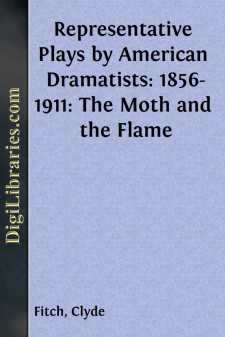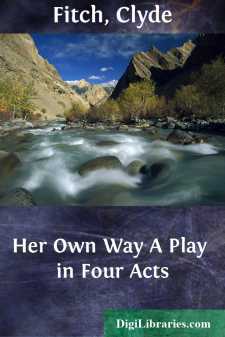Categories
- Antiques & Collectibles 13
- Architecture 36
- Art 48
- Bibles 22
- Biography & Autobiography 813
- Body, Mind & Spirit 142
- Business & Economics 28
- Children's Books 17
- Children's Fiction 14
- Computers 4
- Cooking 94
- Crafts & Hobbies 4
- Drama 346
- Education 46
- Family & Relationships 57
- Fiction 11829
- Games 19
- Gardening 17
- Health & Fitness 34
- History 1377
- House & Home 1
- Humor 147
- Juvenile Fiction 1873
- Juvenile Nonfiction 202
- Language Arts & Disciplines 88
- Law 16
- Literary Collections 686
- Literary Criticism 179
- Mathematics 13
- Medical 41
- Music 40
- Nature 179
- Non-Classifiable 1768
- Performing Arts 7
- Periodicals 1453
- Philosophy 64
- Photography 2
- Poetry 896
- Political Science 203
- Psychology 42
- Reference 154
- Religion 513
- Science 126
- Self-Help 84
- Social Science 81
- Sports & Recreation 34
- Study Aids 3
- Technology & Engineering 59
- Transportation 23
- Travel 463
- True Crime 29
Representative Plays by American Dramatists: 1856-1911: The Moth and the Flame
by: Clyde Fitch
Description:
Excerpt
CLYDE FITCH
(1865-1909)
Clyde Fitch brought a vivacity to the American stage that no other American playwright has thus far succeeded in emulating. The total impression of his work leads one to believe that he also brought to the American stage a style which was at the same time literary and distinctly his own. His personality was interesting and lovable, quickly responsive to a variety of human nature. No play of his was ever wholly worthless, because of that personal equation which lent youth and spontaneity to much of his dialogue. When he attained popular fame, he threw off his dramas—whether original or adapted from the French and German—with a rapidity and ease that did much to create a false impression as to his haste and casualness. But Fitch, though a nervously quick worker, was never careless. He pondered his dramas long, he carried his characters in mind for years, he almost memorized his dialogue before he set it down on paper. And if he wrote in his little note-books with the same staccato speed that an artist sketches, it was merely because he saw the picture vividly, and because the preliminaries had been done beforehand.
The present Editor was privileged to know Fitch as a friend. And to be taken into the magic circle was to be given freely of that personal equation which made his plays so personal. This association was begun over a negative criticism of a play. An invitation followed to come and talk it over in his Fortieth Street study, the same room which—decorations, furniture, books and all—was bequeathed to Amherst College, and practically reproduces there the Fitchean flavour.
I have seen Clyde Fitch on many diverse occasions. Through incisive comment on people, contemporary manners, and plays, which was let drop in conversation, I was able to estimate the natural tendency of Fitch's mind. His interest was never concerned solely with dominant characters; he was quick rather to sense the idiosyncrasies of the average person. His observation was caught by the seemingly unimportant, but no less identifying peculiarities of the middle class. Besides which, his irony was never more happy than when aimed against that social set which he knew, and good-humouredly satirized.
To know Clyde Fitch intimately—no matter for how short a while—was to be put in possession of his real self. From early years, he showed the same tendencies which later developed more fully, but were not different. Success gave him the money to gratify his tastes for objets d'art, which he used to calculate closely to satisfy in the days when "Beau Brummell" and "Frédéric Lemaître" gave hint of his dramatic talent. He was a man of deep sentiment, shown to his friends by the countless graceful acts as host, and shown to his players. As soon as a Fitch play began to be a commodity, coveted by the theatrical manager, he nearly always had personal control of its production, and could dictate who should be in his casts. No dramatist has left behind him more profoundly pleasing memories of artistic association than Clyde Fitch. The names of his plays form a roster of stage associations—the identification of "Beau Brummell" with Richard Mansfield; of "Nathan Hale" with N. C. Goodwin; of "Barbara Frietchie" with Julia Marlowe; of "The Climbers" with Amelia Bingham; of "The Stubbornness of Geraldine" with Mary Mannering; of "The Truth" and "The Girl With Green Eyes" with Clara Bloodgood—to mention a few instances. Those who recall happy hours spent with Fitch at his country homes—either at "Quiet Corner," Greenwich, Connecticut, or at "The Other House," Katonah, New York, have vivid memory of his pervasive cordiality. His players, likewise, those whose identifying talent caught his fancy, had the same care and attention paid them in his playwriting. Sometimes, it may be, this graciousness of his made him cut his cloth to suit the figure. "Beau Brummell" was the very mold and fashion of Mansfield: but that was Brummell's fault and Mansfield's genius, to which was added the adaptability of Fitch. But there are no seams or patches to "Captain Jinks of the Horse Marines"—its freshness caught the freshness of Ethel Barrymore, and Fitch was confident of the blend. His eye was unerring as to stage effect, and he would go to all ends of trouble, partly for sentiment, partly for accuracy, and always for novelty, to create the desired results. Did he not, with his own hands, wire the apple-blossoms for the orchard scene in "Lovers' Lane?" Was he not careful to get the right colour for the dawn in "Nathan Hale," and the Southern evening atmosphere in "Barbara Frietchie?" And in such a play as "Girls," did he not delight in the accessories, like the clatter of the steam-pipe radiator, for particular New York environment which he knew so graphically how to portray?
That was the boy—the Peter Pan quality—in Clyde Fitch; it was not his love for the trivial, for he could be serious in the midst of it. His temperament in playwriting was as variable as Spring weather—it was extravagant in its responsiveness to the momentary mood....






